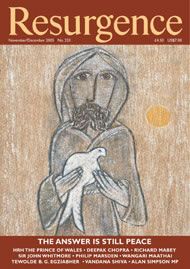TIME WAS UP for communism when the Berlin Wall came down. Walls are unambiguous symbols of fear and control, whether they are intended to keep people in or keep them out. Time is now running out for capitalism too, and it is ironic that Wall Street is one of its main homes. For many, the possibility that capitalism is just another failure of communist proportions is unthinkable.
So how well or how badly does capitalism work now, and by what criteria should it be judged? In simple relativistic terms, it works better than communism by most standards. However, if you believe that Soviet communism was worse than capitalism in every way, just ask rural Russian workers today, or the many victims of recent crime in Moscow. But undoubtedly capitalism does work - for half the world: the rich half. Any system that encourages competitive greed will create wealth, and will spawn considerable benefits such as innovative technology, new medicines, cheaper consumer products and the like.
In absolute terms, however, capitalism is an obscene failure. We have a world in which 40,000 people die every day for lack of basic needs although surplus exists; our habitat and countless species are being destroyed at an alarming rate by commercial exploitation; wars are fought over the desire to control natural resources. Capitalism makes lethal weaponry available to all, tears down our rainforests and deprives the thirsty of their water rights - all for profit. Furthermore, a recent survey showed us that six out of every ten people who work within the capitalist system are miserable. Yes; let's face it, capitalism is a failure, a miserable failure.
However, horrendous as those things are, they are but the short-term manifestations of an even more serious long-term malaise. All-consuming consumerism has brought the psycho-spiritual evolutionary journey of Western man and woman to a standstill, or even into regression, in a few decades. Through the glorification of material excess as the ultimate goal in life, and by rewarding effort for gain rather than for good, people are led into the 'never-enough' disappointment trap. The illusion of progress, the numbing and dumbing of human development, and the diminishing of the human spirit have been foisted on us, and especially on our children, by the priests and profits of capitalism.
We are stuck at the level of quantitative material gain, and neglect qualitative living and learning. We have acquired much technical knowledge from and for our material advancement, but we have lost the wisdom to deploy it well. Unscrupulous Western businesses promote the pointless acquisition of excess, of the frivolous, of over-priced branded goods manufactured in far-away places by children working punitive hours in shocking conditions for a pittance. More alarming still is that it may be the best job they can get.
To secure a market, poorer countries are compelled to sell their natural resources abroad too cheaply, and those that toil to harvest them go hungry, while comparable growers in the rich countries receive government subsidies. These are nothing less than crimes perpetrated by the arrogant upon the ignorant and innocent. Political and corporate leaders, along with the silent majority by whose apathy their actions are condoned, suffer from a blend of myopia and denial of epidemic proportions.
THE PSYCHOLOGICAL FUNCTION of denial is to enable us to retain the capacity to act in the face of crisis for our own survival. Denial is the way leaders manage the guilt that they would otherwise feel for their duplicity. They deny the inequity that abounds in our world; they deny global environmental degradation. Corporate leaders deny personal responsibility for any of it, claiming that is the job of politicians, and that CEOs are charged with maximising shareholder value by law. Yet half of the largest economies in the world are corporations, not countries, and with power comes responsibility - unless one is in denial. Denial enables us to sustain the creed of greed we know as capitalism. The political and corporate leadership, and half the population of the US, live in isolated ignorance of the real world and promote their way of life as the answer for, and the envy of, the rest of the world. Sadly, millions of starry-eyed emerging consumers in non-industrialised countries are destined to fall for it now - and pay for it later.
Greed is not new. It pre-existed capitalism by millennia. It just shows up in even sharper relief at a particular stage of social evolution. This assertive/competitive state of consciousness is the fuel that drives individuals and businesses to strive for ever more and ever bigger. This stage is best described as the need for status and recognition, and naturally we have an economic system commensurate with that need. Capitalism glorifies it, such that it becomes our way of life, and keeps people stuck there. They see it as an end in itself, rather than as the passing level of immaturity that it reflects. This was accentuated when the Berlin Wall fell, since, in simplistic dualistic thinking, some people became convinced that capitalism was indeed the right or the best social structure for the world from then on.
A basic understanding of the evolutionary process should tell us that it is time to move on up to the next level, now the current system has become obsolete and the harm it is doing is intolerable for much of the world. Capitalism was invented in the West for Westerners and it offered riches to others who joined the club. It soon became so pervasive and dominant that other cultures were obliged to abandon their own evolutionary choices and adopt the Western system or die. Many of them die anyway, for Western capitalism does little to feed them: it serves Westerners first. Communism was seen as the only alternative, and it had some appeal as a collective counterweight to self-serving capitalism, but, at least in the way it was imposed and malpractised in the Soviet Union, it was doomed anyway.
In his book Natural Capitalism, Paul Hawken seeks to give capitalism a makeover by pointing out that it does not meet its own stated intent of free-market economics. However, he points out, if restructured to do so, if certain products and policies were not subsidised, if sustainability costs were factored in, and if future generations were to be considered, most of our harmful actions would be too costly and therefore would not occur. Others point to certain capitalists like Ricardo Semler of Semco and Ray Anderson of Interface who are doing very well by doing good, but claim that people like them will always be the exception. Not necessarily so, says Frank Dixon, the leading advocate of Total Corporate Responsibility, who demonstrates how many corporations could profit hugely by bucking the system and becoming more ethical, more economical and more ecological. But will they listen?
Many more advocates of change see no hope other than an economic meltdown, an environmental disaster of huge proportions, social unrest or a war that would bring the present economic system to a timely end. They hope that a better phoenix will arise from the ashes of capitalism. If it does, it must not be called capitalism, for that would perpetuate the obsolete definition. Capitalism and communism are no longer 'isms', but 'wasms', both. 'Human capital', 'natural capital', 'human assets', 'triple bottom line' are phrases which serve to legitimise the ethically illegitimate. When we change the language, we change our thinking, we reframe our perception, we shed past concepts and we are obliged to create anew.
Capitalism has spawned its own language that disguises many uncomfortable truths. What are investors if they are not gamblers? What are tobacco executives guilty of, if not genocide? - for at 9,000 deaths a day they match the peak death rate of Auschwitz. For 'collateral damage', read 'civilian casualties'; for 'advertising' and 'public relations' read 'manipulation', for 'consumer', read 'dupe', and for a contradiction in terms, try 'business ethics'. Denial drives us to sanitise our language, while uncompromising terminology forces us to face reality. It is time for us to shed our denial, our dismissal, and our discomfort with hard talk about a hard subject. It is time for us to engage, debate and create a better future for all.
WHAT WE NEED is an economy that is in service to people; that enables all six and a half billion of us to exchange goods and services to the equitable benefit of all. Under capitalism, ordinary people are in service to the economy, subservient to it or even expendable. Such compliance should only be expected if the economy were truly for the common good; but it isn't. We have the right to demand a fundamental reversal of priority that changes the nature and the purpose of the economy to one that places people and our planet at the hub of life, not pounds and profit. Such a shift would de facto spell the end of capitalism as we know it.
A number of visionaries over the ages have anticipated a new economic order. Marx was badly misinterpreted; Mahatma Gandhi spoke of localised economy, decentralisation, self-organising and self-management; more recently Muhammad Yunus founded the Grameen Bank, the first successful model for microcredit worldwide. Today Bernard Lietaer is one of the leading innovators on the subject of new economic systems. Their contributions are all important. However, the new socio-economic order will be designed neither by one visionary nor by a team of social engineers; nor will it be adopted as a finished product.
It will emerge and evolve from the will and creativity of ordinary people as society as a whole gradually moves towards self-belief and then self-actualisation. At these levels people's tastes become more utilitarian as they no longer have to prove themselves by material or power display. At the same time their vision broadens and their focus turns from self towards the needs of others and the desire to make a contribution to society and all of life. The emerging socio-economic order will be designed for and commensurate with the expression of inclusive, caring and collaborative values.
IN MY WORK, I meet more and more business people who secretly despise the system they are a part of, who deplore the lack of corporate values, who know their products and services are of little consequence, and who would love to be out of it and do something more meaningful; but they have a mortgage and a Mercedes to service, and two point four children in private education who would feel deprived and vulnerable without the latest in brand-name clothing that their peers all parade in. It takes courage to step out of the line - more than most can muster. So they don their suit and tie and serve the system, but they glance more often out of the window. The spirit is stirring in such people, and they are increasingly asking themselves tough questions.
There is however an anomaly here. Those who occupy leadership roles, under the old rules, are all too often the power hungry, the fear-driven control freaks, and the insecure who have something to prove. Bosses are often less mature than the community they govern and employ, and consequently they lose respect and control. Their fear and denial increase, as do their autocratic ways, their arrogance, and their isolation from reality. This is so apparent today among our political and corporate leaders. The capitalist system on which their authority stood is breaking up like an ice-cap under global warming, and they are left floating, disconnected, unstable and fearful, while ordinary people, with less invested in old illusions, seek to build bridges.







